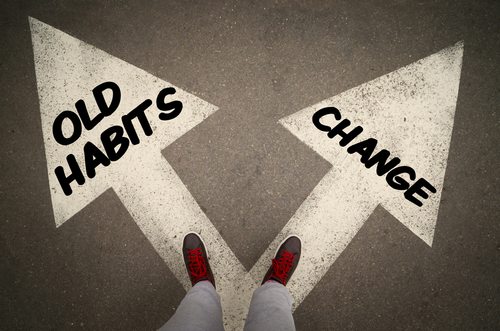
14 Feb The Power of Habits
In his book entitled The Power of Habit, Charles Duhigg breaks down habits into their component parts to explain why they become so routine, and as a result why bad habits are difficult to stop and good habits may be just as difficult to start. He also identifies “Key Habits” – which are habits that create a cascade of good or bad outcomes. One such key habit with positive outcomes is the key habit of exercise, which is linked to other healthy and productive habits. Another key habit with less positive outcomes is smoking, which tends to be related to drinking, limited exercise, poor nutrition, and limited social engagement.
While we are frequently trying to encourage patients and clients to begin the key habit of exercise, we are also trying to discourage habits. Here are 5 key (negative) habits that we strongly encourage replacing with exercise or other more active and positive habits:
- Prolonged Sitting: which leads to abnormal postural strain and reduced overall activity
- Fear of movement: which leads to avoidance behaviors and persistence of pain symptoms
- Lack of motivation to improve: leading to a failure to embrace responsibility to self-help
- Seeking passive solutions: leading to poor active participation and thus ownership of recovery
- Poor sleep habits: which enhance pain, limit energy, and provide a poor foundation for healing.
Individually, each of these poor habits contribute to faulty posture, poor movement patterns, fatalistic thinking, waiting for a “rescue,” and the lack or restorative energy for healing. Taken together in whatever combination you choose, we find that these habits are related to a poorer prognosis for treatment, resulting in it being more likely that your condition will become chronic. This is not a desirable outcome.
How do you identify poor habits that may be contributing to pain or difficulty moving well or being unable to attain your desired level of function? Obvious bad habits may create pain as you are performing the task, like prolonged computer work or poor lifting mechanics. Some may be stealthier in undermining your health; and if you struggle to identify a key habit to replace, you may find that a family member, friend, or co-worker has observed a poor habit that you are unaware of.
Sometimes what we need is an objective professional perspective. Our staff of trained habit- breakers can help you identify and replace bad or faulty habits that are preventing you from enjoying home, work, fitness, or recreational activities. If you need our assistance, call today for an appointment at any of our 5 Indianapolis-area locations to get you back on the road to good physical health.
As always, Movement Matters.
Best,
Brian




